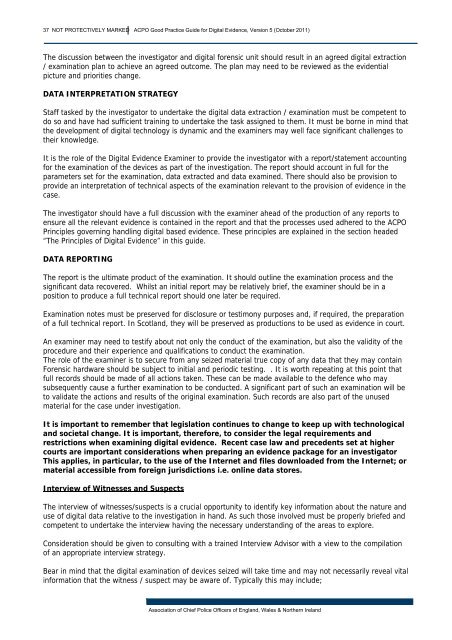ACPO Good Practice Guide
ACPO Good Practice Guide
ACPO Good Practice Guide
You also want an ePaper? Increase the reach of your titles
YUMPU automatically turns print PDFs into web optimized ePapers that Google loves.
37 NOT PROTECTIVELY MARKED <strong>ACPO</strong> <strong>Good</strong> <strong>Practice</strong> <strong>Guide</strong> for Digital Evidence, Version 5 (October 2011)<br />
The discussion between the investigator and digital forensic unit should result in an agreed digital extraction<br />
/ examination plan to achieve an agreed outcome. The plan may need to be reviewed as the evidential<br />
picture and priorities change.<br />
DATA INTERPRETATION STRATEGY<br />
Staff tasked by the investigator to undertake the digital data extraction / examination must be competent to<br />
do so and have had sufficient training to undertake the task assigned to them. It must be borne in mind that<br />
the development of digital technology is dynamic and the examiners may well face significant challenges to<br />
their knowledge.<br />
It is the role of the Digital Evidence Examiner to provide the investigator with a report/statement accounting<br />
for the examination of the devices as part of the investigation. The report should account in full for the<br />
parameters set for the examination, data extracted and data examined. There should also be provision to<br />
provide an interpretation of technical aspects of the examination relevant to the provision of evidence in the<br />
case.<br />
The investigator should have a full discussion with the examiner ahead of the production of any reports to<br />
ensure all the relevant evidence is contained in the report and that the processes used adhered to the <strong>ACPO</strong><br />
Principles governing handling digital based evidence. These principles are explained in the section headed<br />
“The Principles of Digital Evidence” in this guide.<br />
DATA REPORTING<br />
The report is the ultimate product of the examination. It should outline the examination process and the<br />
significant data recovered. Whilst an initial report may be relatively brief, the examiner should be in a<br />
position to produce a full technical report should one later be required.<br />
Examination notes must be preserved for disclosure or testimony purposes and, if required, the preparation<br />
of a full technical report. In Scotland, they will be preserved as productions to be used as evidence in court.<br />
An examiner may need to testify about not only the conduct of the examination, but also the validity of the<br />
procedure and their experience and qualifications to conduct the examination.<br />
The role of the examiner is to secure from any seized material true copy of any data that they may contain<br />
Forensic hardware should be subject to initial and periodic testing. . It is worth repeating at this point that<br />
full records should be made of all actions taken. These can be made available to the defence who may<br />
subsequently cause a further examination to be conducted. A significant part of such an examination will be<br />
to validate the actions and results of the original examination. Such records are also part of the unused<br />
material for the case under investigation.<br />
It is important to remember that legislation continues to change to keep up with technological<br />
and societal change. It is important, therefore, to consider the legal requirements and<br />
restrictions when examining digital evidence. Recent case law and precedents set at higher<br />
courts are important considerations when preparing an evidence package for an investigator<br />
This applies, in particular, to the use of the Internet and files downloaded from the Internet; or<br />
material accessible from foreign jurisdictions i.e. online data stores.<br />
Interview of Witnesses and Suspects<br />
The interview of witnesses/suspects is a crucial opportunity to identify key information about the nature and<br />
use of digital data relative to the investigation in hand. As such those involved must be properly briefed and<br />
competent to undertake the interview having the necessary understanding of the areas to explore.<br />
Consideration should be given to consulting with a trained Interview Advisor with a view to the compilation<br />
of an appropriate interview strategy.<br />
Bear in mind that the digital examination of devices seized will take time and may not necessarily reveal vital<br />
information that the witness / suspect may be aware of. Typically this may include;<br />
Association of Chief Police Officers of England, Wales & Northern Ireland


